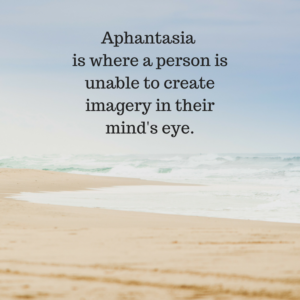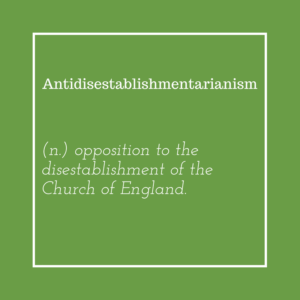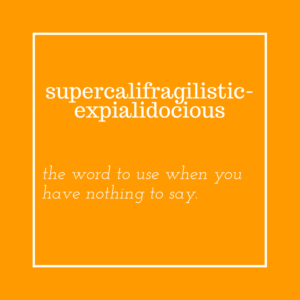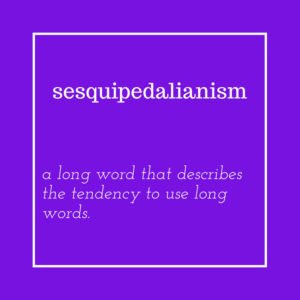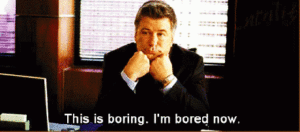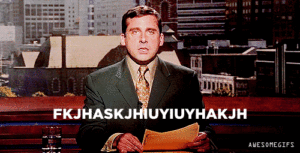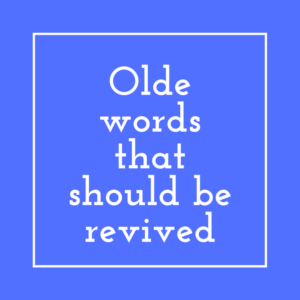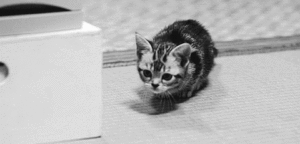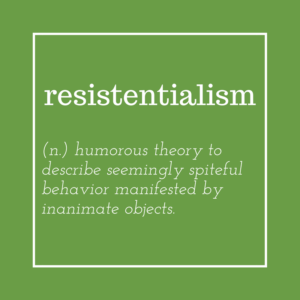J.A. Andrews's Blog, page 4
August 25, 2018
Aphantasia part 2 – Answers to Your Questions
It was fun getting responses from my last post about how I don’t have much of a visual imagination.
A good number of you wrote to say you could relate to it, and it’s always nice to find others who think like we do. 
Aphantasia – or Writing When You Can’t See the Story
I discovered something about myself in my adult life: I have aphantasia.
What this means is that I don’t construct visual images in my mind. Neither in my imagination or with my memories.
Honestly, until I was in my twenties, I had no idea other people could.
I figured when people “pictured things in their mind,” they were speaking metaphorically and just recreating the feel of the thing.
I can pull up an indistinct, sketchy image, like a vague watercolor. But mostly, if you ask me to think of a beach, I’ll imagine the texture of sand, the warmth of the sun, and the sound and feel of lapping waves, instead of creating a detailed image.
My husband is highly visual. When he reads books he says it’s like a movie playing out in his mind.
I can read a book and thoroughly enjoy the story without ever picturing the characters and only vaguely picturing the setting. I’m 4 books into Lindsay Buroker’s Emperor’s Edge books (which are fantastic), and have just now solidified the idea in my head that the assassin Sicarius has short blond hair. I only remember it now because the main character, Aramanthe, has recently touched his hair. When it was just a visual clue, my brain ignored it.
My husband would have known from the first moment Sicarius was described.
Some people talk about aphantasia as though it’s some sort of disability, but to me, it’s just a different way of thinking and remembering.
When I think of the beautiful lookout we stopped at on a pass between Wyoming and Idaho years ago, I can’t recreate the exact picture. But I remember the vastness of it, the way the mountains piled up, one behind another, paling as they shrank down into a blazing, cloud-filled valley. I know that the air was vigorously fresh, and everything about the moment flung out in a wild freedom.
And so I don’t miss the fact that I can’t picture it with visual details.
If I see a picture of that pass, I recognize it immediately. But if you take the picture away, I can’t recreate the image in my mind.
There was an exhibit at the Chicago Museum of Science and Industry once that tested facial recognition. It flashed a face up on a screen for a second or two, then you had to spin some wheels to select the right hair, eyes, nose, and mouth of the person you’d just seen.
I just stared at the exhibit wondering what I was missing. Why would they ask something so impossible? My husband walked up, did a couple faces without blinking, and moved on because it was boring.
That was the first time I KNEW something was different in my brain.
Which leads me to one of my worst fears:
When I was little, I thought police sketch artists were just a device that TV shows used to tell the cops who the bad guy was. Because how could someone in real life remember a face well enough to describe it to an artist? And more impossible yet, have them adjust the picture until it was right?
If I’m ever the sole witness to a crime, people, we’re in trouble. Unless the police are good at picking out criminals from descriptors like, “He was smallish, but fierce. His hair was…um…well, it looked a little angry. Also, he skulked.”
The question I always get next is: How do you describe things in you books without being able to see them in your mind?
Which is an excellent question, and shall be answered in my next post.
The post Aphantasia – or Writing When You Can’t See the Story appeared first on JA Andrews.
August 4, 2018
Are we tired of long words yet?
It’s August. Does anyone have any idea how that happened?
Just wanted to drop a quick post today with a few more interesting long words:
Unimaginatively has a lot of vowels—eight in total, if you count the final y. Which of course you SHOULD. Seeing as it’s being used as a vowel.
The cool thing about this word is that its vowels and consonants alternate.
But it’s not the longest word of that kind.
That would be honorificabilitudinitatibus, of course. A twenty-seven-letter way of saying “with honorableness.”
Which none of us will ever use.
And I have two final words for you in our sesquipedalian journey into the land of long words. (Sesquipedalian, if you forgot, is the satisfyingly long word meaning the tendency to use long words.)
Isograms are words that do not repeat any letters. Two beautifully long examples are:
Uncopyrightable, coming in at 15 letters and
Subdermatoglyphic, which is a wee bit longer (17 letters), but obviously less useful in day-to-day chat. It has to do with the whorls, arches, and ridges of your fingertips, though, which is cool.
And that wraps up our Long Words study. I can honestly say that not a single one of these words has made it into my daily life, but I’ve had fun. 
July 27, 2018
The Long and the Short of it – Part 3
We’ve talked about ridiculously long words, and vaguely more recognizable long words.
Today’s words aren’t very long, but they are the longest of their kinds.
Can I buy a vowel, Pat?
Euouae is only six letters long, but every single letter is a vowel.
If you’re wondering what it means, it’s a musical term from medieval times. So, I’m sure you’ll find all sorts of ways to use it in everyday conversation.
And its pronunciation is…disputed. I found several ways to pronounce it, along with opinions that it shouldn’t be pronounced at all, since it is really more of a mnemonic for the vowels of the words at the end of liturgical chants and hymns. Above the “euouae” are the notes indicating how the last six notes should be sung.
Anyway, this little guy actually holds two Guinness World Records
It’s the longest English word composed exclusively of vowels.
It has the most consecutive vowels of any word.
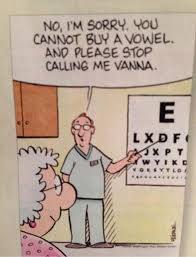
No. There are no vowels left.
If you tsktsk someone, you indicate your disapproval by makeing a tsktsk sound.
Tsktsk is the longest word that doesn’t contain a vowel.
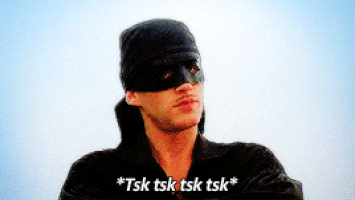
So now no one will ever tsktsk you for not knowing what euouae means.
You’re welcome.
The post The Long and the Short of it – Part 3 appeared first on JA Andrews.
July 24, 2018
The Long and the Short of It – Part 2
Let’s continue our little foray into long words, shall we? We covered some extremely long words last time, but they were weird. Now we come to some that are more recognizable, but still rack up the letters.
Antidisestablishmentarianism (twenty-eight letters) was originally used to described opposition to the disestablishment of the Church of England. Which is a lot of negatives.
If they were against DISestablishing, doesn’t that make them in favor of establishing? Couldn’t they just have called themselves establishmentarians?
No, because then we wouldn’t have this gloriously long word.
The longest word you probably know, but I’m not sure if it should count or not, is of course,
supercalifragilisticexpialidocious (thirty-four letters).
Mary Poppins said it’s the word to use “when you have nothing to say.”
Surprisingly, it does appear in some (but not all) dictionaries.
And finally, sesquipedalianism.
Which I’m so pleased to say, is a long word that describes the tendency to use long words.
The post The Long and the Short of It – Part 2 appeared first on JA Andrews.
The Long and the Short of It – Part 1
I thought I’d start a little summer series on the longest words in English.
But then I realized the longest words are all scientific and boring.
(No offense to you scientists who use the chemical name for the titin portion that takes FIFTY-SEVEN PAGES to write. It has almost 200,000 letters. Which feel ridiculous. Call it something like “titan longus maximus” and be done. Also, for those of you with insane amounts of time to kill, apparently there’s a YouTube video where a man sounds it out for you. But it’s just over three hours long.)
Instead, today let’s talk about more common words that are still really long.
I’m going to skip the lung disease Pneumonoultramicroscopicsilicovolcanoconiosis (45 letters), and the thyroid condition Pseudopseudohypoparathyroidism (30 letters), and get to words we use.
Because it is so pleasing that another really long word is
Floccinaucinihilipilification.
Coming in at twenty-nine letters, it means the action or habit of estimating something as worthless.
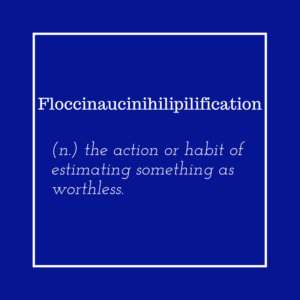
Which is just so perfect since it, itself, is pretty worthless as a word.
As you can guess, it’s almost never used. Except in articles about really long words.
Stay tuned for so much more fun with long words in the next couple of weeks.
Writing Update:
I’ve been quiet around here because I’ve been working like crazy to get book 2 of The Keeper Chronicles done. I have lots of good book things coming up soon.
I’m publishing and expanded version of A Threat of Shadows, which is Book 1 of the Keeper Chronicles at the end of August, and Book 2 will follow quickly after.
Stay tuned for peeks at maps, artwork, covers, giveaways, and all sorts of good bookish things.
The post The Long and the Short of It – Part 1 appeared first on JA Andrews.
March 10, 2018
Olde words to revive
I have a little verbal gift for you today from ye olde days of yore.
Meg Cowley brought to my attention a fabulous list of old words that we need to revive.
The list is awesome, but since I’m having a hard time finding a source for it, I’m just going to tell you a couple of my favorites.
Apricity: the warmth of the sun on a cold winter day. (That is such a thing. And I’m inordinately happy to have a word for it.)
Bedward: heading toward bed
To gorgonise: to have a paralyzing affect on someone
To hugger-mugger: to act in a secretive manner
Malagrugrous: dismal (The two r’s are challenging to get the tongue around.)
Monsterful: wonderful (We need to incorporate this into the vocabulary of the general population by Halloween.)
Overmorrow: the day after tomorrow (This is the perfect word.)
Twitter-light: twilight (I think this one especially applies to twilights that involve fireflies)
(photo:Thanatip S./Shutterstock)
Overmorrow and hugger-mugger are two I’ve already worked into my kids’ vocabularies.
They may be surprised later in life to learn no one knows what they’re talking about.
You’re welcome for that, kids.
The post Olde words to revive appeared first on JA Andrews.
January 23, 2018
American English vs. British English
…that before the American Revolution, both America and Britain spoke like the Americans do today?

I am not kidding about this.
All these period movies where everyone speaks exactly like the British today are wrong!
Scandalous, I know.
Turn out “(i)t is the standard British accent that has drastically changed in the past two centuries, while the typical American accent has changed only subtly.” (source)
Apparently there were a lot of folks from lower birth ranks in and around London around the time of the American Revolution, who became quite wealthy thanks to the Industrial Revolution. In an effort to distinguish themselves from other commoners, they cultivated a newer pronunciation. It caught on well and soon tutors were teaching everyone to speak like the British speak today.
This, for some reason, turns my entire world upside-down.
I just cannot imagine King George grumbling about the troublesome colonists—in an American accent. It’s just wrong.
Am I the only person who didn’t know this?
(For further reading, this was an interesting article.)
The post American English vs. British English appeared first on JA Andrews.
January 4, 2018
Too many books is a good thing.
Have you made New Year’s Resolutions for how to get through that ridiculously long To Be Read list?
Because mine will take me the next hundred years to get through. If I did nothing else.
But you guys, I have excellent news.
And I know you’re going to be excited about it because:
1. A while ago I shared a page with you that will calculate how long it’s going to take you to read your To Be Read list.
(Which led to the discovery that a lot of you need more than one lifetime to finish your current list. Some of you need more than a superhuman live-long-as-the-elves lifetime. )
2. A while ago we also learned the word tsundoku:
(n.) the act of leaving a book unread after buying it, typically piling it up together with other such unread books.
(Which, from your responses, a LOT of you can relate to.)
But GUESS WHAT?
Having more books than you can read is a good thing.

Author and statistician Nassim Nicholas Taleb makes the argument that having more books than you can read isn’t a sign of failure, but a way to “stay intellectually hungry and perpetually curious.” (Jessica Stillman, inc.com)
In his book, The Black Swan, he writes:
A private library is not an ego-boosting appendage but a research tool. Read books are far less valuable than unread ones. The library should contain as much of what you do not know as your financial means, mortgage rates, and the currently tight real-estate market allows you to put there. You will accumulate more knowledge and more books as you grow older, and the growing number of unread books on the shelves will look at you menacingly. Indeed, the more you know, the larger the rows of unread books. Let us call this collection of unread books an antilibrary. (The Black Swan, by Nassi Nicholas Taleb.)
What Taleb is saying is that having unread books reminds you of all the things you don’t know.
Which keeps your brain primed for learning and keeps you humble. Two excellent things.
And I can see the truth in this.
An antilibrary is a beautiful thing.
For non-fiction books, all those unread tomes speak of endless opportunities to stretch your mind in new ways, to make new connections between things you didn’t connect before.
For fiction, it’s like dozens—or hundreds—of rolled up maps of places you haven’t visited yet. Of people you haven’t met, of experiences you’ll never get in real life, but could get through reading.
Do you know how much better this makes me feel about the two cookbooks I have about bread baking that I’ve barely touched?
Well, I’ll tell you: It makes me feel like perfectly kneaded bread, rising in a warm spot.
Because now I don’t just see the cookbooks and feel guilty for not having used them, I see them as portals into that mysterious, magical world of people who can bake bread and make it come out less like a brick, and more like a cloud.
And do you know how much better it makes me feel about my stupid-long, ever-growing fiction To Be Read list?
It makes me feel like I’m standing in some sort of Hall of Doors, where each door leads somewhere different, and I might not end up opening them all, but I could.
And all the doors are there waiting for me, reminding me that there are so many things I haven’t experienced in life, and so many things I can still learn.
Reminding me I don’t know everything. Remind me I have so many ways left to grow.
Which is much better than just feeling guilty that I don’t read more often.
So, from now on, I’ll choose to see my big set of unread books as an antilibrary.
How about you? Does it help to think of your unread books this way? Or are they still just unread book?
The post Too many books is a good thing. appeared first on JA Andrews.
November 19, 2017
Correspondence With My Whisk
I stumbled across a fantastic word this week:
resistentialism
(n.) humorous theory to describe seemingly spiteful behavior manifested by inanimate objects.
I love this word.
Because I’m convinced that inanimate objects are, well, animate.
About a year and a half ago I wrote a blog post about this very issue.
I’ve reprinted it here as proof:
The other day my whisk wrote me a letter.
Chef Woman,
Stop resting me in bowls.
I am a whisk.
I was made to
twirl
and spin
and dance.
Not to rest.
When you put me in a bowl, my soul dies.
I must to leap out.
I must be free.
I was meant for more than resting.
Stop putting me in bowls, Chef Woman.
Sincerely,
Your Whisk
So I wrote my whisk back.
Dear Whisk,
I hate you.
I thought you would know that by the sheer number of times I shout,”I HATE THIS WHISK!” while using you.
You are my whisk . You whisk when I say. You rest when I say.
You are not a gymnast .
The reason you flip out of bowls is because the idiot who made you gave you a metal handle fifteen times heavier than your whisky-wire parts. So when I rest you in the bowl, your stupidly heavy handle flips you out, flinging an arc of pancake batter across the entire kitchen.
And all over me.
This is not ok.
So I am replacing you.
If you’re lucky, I will give you to my daughter and she will adore you and you will twirl and spin and dance while she pretends to make pancakes.
But know this,
if you pull one more Mary Lou Retton move on me before I replace you,
I will donate you to the thrift store
where you will languish for years,
rusting amongst the other utensils who disappointed their owners.
Do not test me on this.
Hugs and Kisses,
Chef Woman
It’s timely that I found this, because – I am not kidding about this – I JUST finished making pancakes for my kids. And the whisk – that same whisk I swore to replace more than a year ago – flipped backwards out of the bowl because of its heavy handle.
Pancake batter everywhere.
Its days are numbered, I tell you.
And I mean it this time.
The post Correspondence With My Whisk appeared first on JA Andrews.

